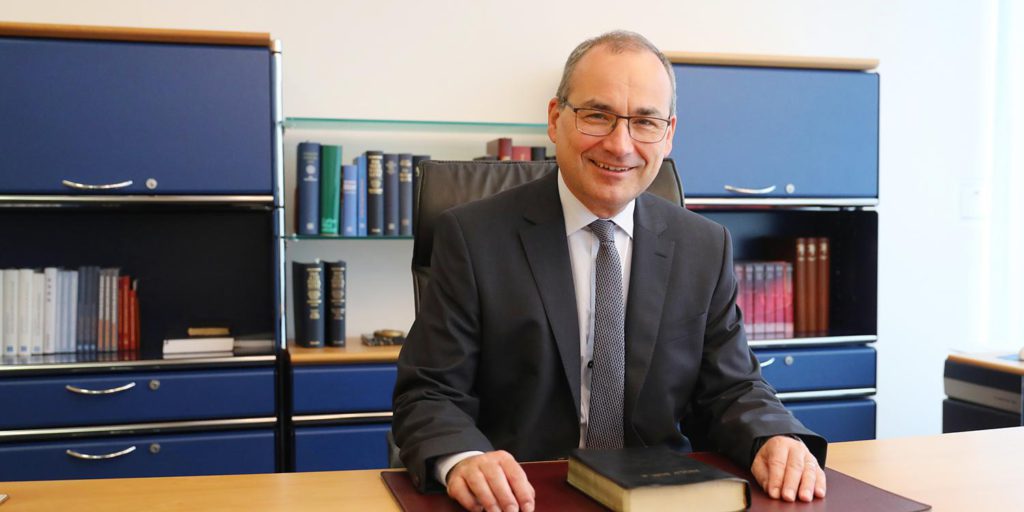The ordination of women—this was the other big item on the agenda of the most recent District Apostle Meeting. What resolutions have already been passed? Which decisions remain to be made? The Chief Apostle answers these questions in the second part of our 2021 annual interview.

Chief Apostle Jean-Luc Schneider, how are the discussions going with respect to the subject of women in ministry? People are always inquiring about this. How do you answer them?
In our deliberations on this vast and multifaceted topic, we allow ourselves to be guided by four fundamental questions: “What does God say?” and “What does the Bible say?” Once we know the answers to these questions we ask: “What does our Church say?” and “What is the situation in the individual countries?” Only once we have found reasonable answers to all of these questions will we know what decision we are able to make. This is how we have always communicated the process to date.
The first question has already been answered, right?
Yes. In November 2020 we discussed the question of the will of God, and published the following collective resolution:
- Man and woman are both equally created in the image of God. They are interdependent and of the same nature and dignity.
- Man and woman are both called to have dominion. The mandate and responsibility to protect and shape the creation applies equally to both genders. In no way can it be inferred from the biblical accounts of the creation that men and women have been assigned different areas of dominion or activity.
- The duties of men and women are understood differently owing to social and political developments within human society, among other things.
So the May conference was all about the statements of Holy Scripture?
Yes. Here we have established two essential substantive considerations to explore: what prompted the Lord to call only men to the Apostle ministry, and how does the early church—as related, for example, in the New Testament’s pastoral letters—talk about the matter? This is the point at which we find ourselves in our current deliberations.
Have there been any resolutions on this second question?
No. The District Apostles will first bring the content of our discussions to their respective Apostle Meetings. Following is our understanding of the notification process: first the Apostles around the world will discuss the current phase of the deliberations. They will then have the opportunity to express their thoughts and submit their statements. At the coming District Apostle Meeting in November 2021, we will resume the discussion thread.
That is a pretty long strategic approach. Can you foresee any particular result?
No. That I cannot do. It is still too early for this. My approach can be quickly explained by way of the fundamental questions outlined above:
- Is it the will of God that women should not be ordained? If the answer is yes, there is no need for further deliberations. If the answer is no, we go on to ask:
- Does the fact that Jesus only called men to the Apostle ministry automatically mean that women cannot be ordained? If the answer is yes, there will be no ordination of women. If it is no, then the following question must be asked:
- Do the relevant statements in the letters of the Apostles in the New Testament make it impossible to ordain women? If so, then there would be no biblical basis for the ordination of women. However, if the answer to this question is no, we must ask:
- Does the Church, or the District Apostle Meeting, want to ordain women into ministry or not? If yes, there are regional and societal implications that must be considered:
- Is there a need to ordain women in a particular area, region, or country? If the answer is no, then there can be no ministry conferred upon women there. In the event the answer is yes, the question is:
- Will the congregations and the society of this region accept the idea of ordaining women into ministry? If the answer is no, there will be no women ordained there. If the answer is yes, the conclusion is:
- Women can be ordained in that particular area, country, congregation.
Thus we have a rather lengthy process ahead of us, which is oriented by the four aforementioned fundamental questions: what does God say? What does the Bible say? What does the Church say? And what does the culture of a particular region say? So far we have answered the first fundamental question. The second question has been discussed in this District Apostle Meeting and will now be brought to the various Apostle Meetings around the global Church for further discussion.
That is our status update.
Source: nak.org
Photo: Oliver Rütten
This post is also available in: Indonesian
